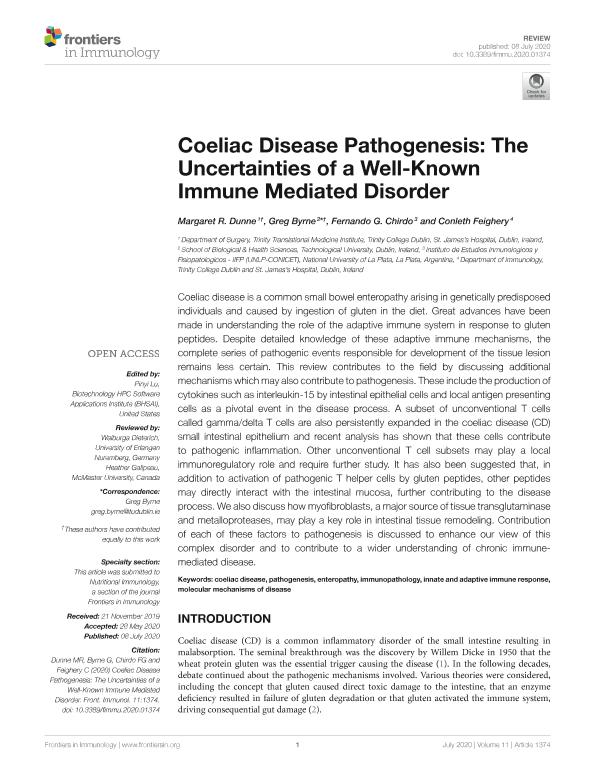Mostrar el registro sencillo del ítem
dc.contributor.author
Dunne, Margaret R.
dc.contributor.author
Byrne, Greg
dc.contributor.author
Chirdo, Fernando Gabriel

dc.contributor.author
Feighery, Conleth
dc.date.available
2022-04-13T15:31:47Z
dc.date.issued
2020-07-08
dc.identifier.citation
Dunne, Margaret R.; Byrne, Greg; Chirdo, Fernando Gabriel; Feighery, Conleth; Coeliac disease pathogenesis: The uncertainties of a well-known immune mediated disorder; Frontiers Media; Frontiers in Immunology; 11; 8-7-2020; 1-14
dc.identifier.issn
1664-3224
dc.identifier.uri
http://hdl.handle.net/11336/155197
dc.description.abstract
Coeliac disease is a common small bowel enteropathy arising in genetically predisposed individuals and caused by ingestion of gluten in the diet. Great advances have been made in understanding the role of the adaptive immune system in response to gluten peptides. Despite detailed knowledge of these adaptive immune mechanisms, the complete series of pathogenic events responsible for development of the tissue lesion remains less certain. This review contributes to the field by discussing additional mechanisms which may also contribute to pathogenesis. These include the production of cytokines such as interleukin-15 by intestinal epithelial cells and local antigen presenting cells as a pivotal event in the disease process. A subset of unconventional T cells called gamma/delta T cells are also persistently expanded in the coeliac disease (CD) small intestinal epithelium and recent analysis has shown that these cells contribute to pathogenic inflammation. Other unconventional T cell subsets may play a local immunoregulatory role and require further study. It has also been suggested that, in addition to activation of pathogenic T helper cells by gluten peptides, other peptides may directly interact with the intestinal mucosa, further contributing to the disease process. We also discuss how myofibroblasts, a major source of tissue transglutaminase and metalloproteases, may play a key role in intestinal tissue remodeling. Contribution of each of these factors to pathogenesis is discussed to enhance our view of this complex disorder and to contribute to a wider understanding of chronic immunemediated disease.
dc.format
application/pdf
dc.language.iso
eng
dc.publisher
Frontiers Media

dc.rights
info:eu-repo/semantics/openAccess
dc.rights.uri
https://creativecommons.org/licenses/by/2.5/ar/
dc.subject
CELIAC DISEASE
dc.subject
PATHOGENESIS
dc.subject
ENTEROPATHY
dc.subject
IMMUNOPATHOLOGY
dc.subject
INNATE AND ADAPTIVE IMMUNE RESPONSE
dc.subject
MOLECULAR MECHANISMS OF DISEASE
dc.subject.classification
Inmunología

dc.subject.classification
Medicina Básica

dc.subject.classification
CIENCIAS MÉDICAS Y DE LA SALUD

dc.title
Coeliac disease pathogenesis: The uncertainties of a well-known immune mediated disorder
dc.type
info:eu-repo/semantics/article
dc.type
info:ar-repo/semantics/artículo
dc.type
info:eu-repo/semantics/publishedVersion
dc.date.updated
2021-09-06T17:48:41Z
dc.journal.volume
11
dc.journal.pagination
1-14
dc.journal.pais
Suiza

dc.journal.ciudad
Lausanne
dc.description.fil
Fil: Dunne, Margaret R.. St. James's Hospital. Trinity College Dublin. Trinity Translational Medicine Institute. Department of Surgery; Irlanda
dc.description.fil
Fil: Byrne, Greg. Technological University of Dublin. School of Biological & Health Sciences; Irlanda
dc.description.fil
Fil: Chirdo, Fernando Gabriel. Consejo Nacional de Investigaciones Científicas y Técnicas. Centro Científico Tecnológico Conicet - La Plata. Instituto de Estudios Inmunológicos y Fisiopatológicos. Universidad Nacional de La Plata. Facultad de Ciencias Exactas. Instituto de Estudios Inmunológicos y Fisiopatológicos; Argentina
dc.description.fil
Fil: Feighery, Conleth. Trinity College Dublin; Irlanda. St. James’s Hospital; Irlanda
dc.journal.title
Frontiers in Immunology
dc.relation.alternativeid
info:eu-repo/semantics/altIdentifier/doi/http://dx.doi.org/10.3389/fimmu.2020.01374
dc.relation.alternativeid
info:eu-repo/semantics/altIdentifier/url/https://www.frontiersin.org/articles/10.3389/fimmu.2020.01374/full
Archivos asociados
